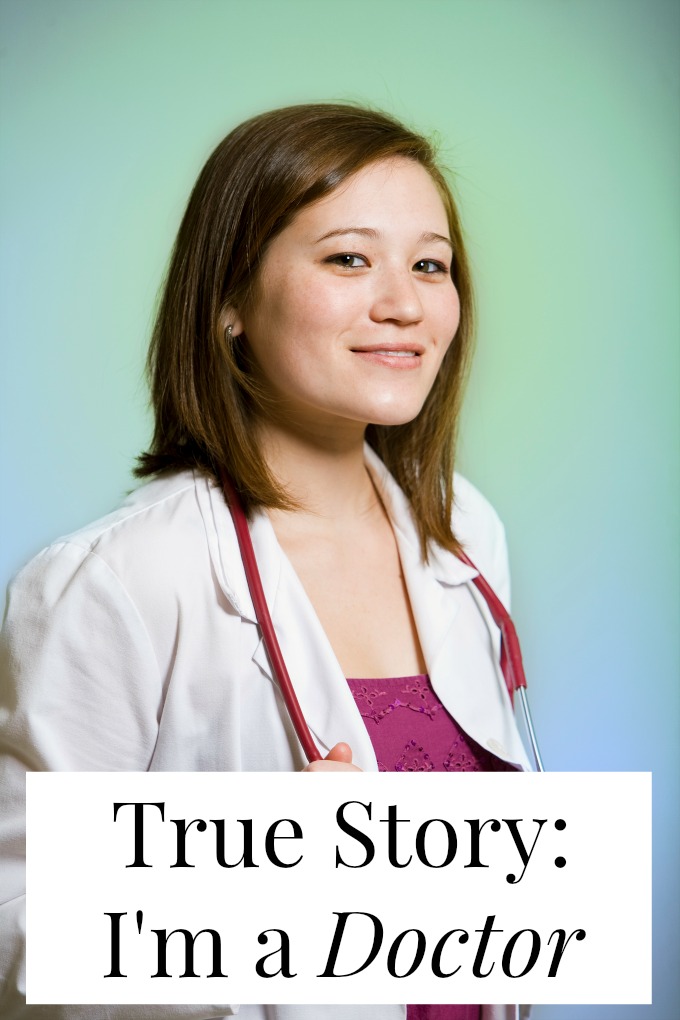Tell us a bit about yourself!
Hi! I am ‘Nicole’, a southern girl, originally from Arkansas who has found my way to the Midwest. I find joy in any excuse to spend time outside: running, gardening. I like to escape my world by traveling as often as possible.
When did you become interested in working in medicine?
At age 12 I decided I was going to become a dermatologist. This may have been inspired by the ever lovely teen acne. At around age 14, I had been involved in enough volunteer activities that I decided to pursue general medicine so that I could be more useful if I decided to practice overseas missions. the desire to pursue general medicine only grew stronger over time.
You’re a general practitioner. Why did you choose this type of medicine rather than nursing or becoming a specialist or a surgeon?
Once I was in medical school, my fit with general practice was very apparent when I found EVERYTHING fascinating for a time but became bored if I saw something over and over again and this fits perfectly as I really never know what is behind that exam room door! Nursing is an amazing field but I wanted to be a diagnostician.
One of the things we hear a lot about is the amount of schooling and debt that doctors go through. And the hours during residency! Can you tell us about your experience?
I only applied to one medical school that just so happens to be inexpensive. I also had scholarships so I am fortunate in that my debt, while six figures, is a low six figures.
I spent four years in medical school followed by three years in residency. The humane rules that are now in place in many residencies were just beginning to form when I was going through. We could not work for more than 30 hours at a time and often pushed to that very hour (this exempted required educational activities).
Most of us are completely mystified by the healthcare industry – how insurance works, why things cost so much, why an appointment with one doctor costs more than an appointment for the same thing with a different doctor. Could you shed a bit of light on that?
I received exactly zero training on insurance so I would not be helpful there. Once in practice, I found that insurance companies actually contribute to the majority of my headache related paperwork and their rules/regulations are different with each company. Medicare does set the standard for many of our prescribing practices.
I will give an example of typical headache inducing paperwork:
I have a 40 something-year-old patient with asthma whose symptoms worsen with change of season/allergy related. It is March and I prescribe a daily inhaler that has worked for years to prevent her asthma symptoms.
I get a fax the following day that her insurance has decided to not cover this inhaler this year (it has in years past).
In order to get it covered, I am required to complete a form which details her diagnosis, symptoms, and every medication tried in the past to obtain a “prior authorization.” I then fax that in and am often denied.
I put my nurse on the job to repeal. She has to call the insurance company and the repeal is often granted after a few questions (once she has sat on hold for up to two hours, of course). You can see how this slows down the day and worst of all, the patient is relying on her rescue inhaler in the interim to calm her wheezing and shortness of breath.
I have no control over the cost of medications/procedures/injections. I do prescribe generics as often as possible.
In regard to appointments with the differences in costs, this is a bit complicated but to simplify:
Each specialty is assigned a unit numbers called RVU; RVUs translate to cost of care. Each specialty has their own RVU value. Pediatricians and family docs are at the bottom and specialists like cardiologists and neurosurgeons at at the top.
So, your visit with me may take more time but is worth less than the visit with your ophthalmologist who may see you briefly.
What has surprised you about your work?
As a general practitioner, you are dealing with the whole person, not just one body part. This is wonderful and I feel honored to serve in this capacity for my patients. Having said this, many, MANY problems are rooted in psychological turmoil and while I am trained to recognize this, I am not trained to treat. That’s a psychologist’s role. Unfortunately, insurance does not always cover this well or the patient simply does not have the time. That is a real challenge and I have had to recognize the draining effect of that on my own psyche.
Also, in a most naive frame of mind, when I first began I was shocked by the suspicion and skeptical reaction from patients to doctor suggestions. I truly went into medicine to help and that was a shocker! (Again, I recognize the naivete!)
I’m sure most of us have gone to the doctor and had to wait a loooong time for our appointment. Why does this happen?
Great question! There are so many potential reasons.
If I am running behind it is often due to:
*your appointment was at 1:45 and you arrived so nicely at 1:40. The person before you arrived seven minutes late, nearly halfway through their appointment. If I know the on-time person will be straightforward I’ll try to see them first but it doesn’t always work out that way.
* your appointment was at 1:45 and you arrived so nicely at 1:40. The person before you arrived seven minutes late, nearly halfway through their appointment. If I know the on-time person will be straightforward I’ll try to see them first but it doesn’t always work out that way.
* the 15-minute appointment two patients ahead of you was labeled as “sinus infection” but it turns out the patient’s husband has just been diagnosed with cancer (or passed away, etc).
* the 15-minute appointment two patients ahead of you was labeled as “sinus infection” but he/she also wanted to discuss back pain, frequent headaches, trouble urinating, and depression.
* the 15-minute appointment two patients ahead of you was labeled as “sinus infection” but he/she also wanted to discuss back pain, frequent headaches, trouble urinating, and depression.
* I had a patient walk in with a laceration to their hand.
* I had a patient walk in with chest pain.
* I got a call from a specialist who needed to discuss a common patient of ours.
* I had to call a patient with an acute finding on a study (the belly pain from earlier this morning actually was appendicitis and we need to get them to the hospital)
What are some of the hardest conversations you’ve had to have with patients?
Child abuse suspicion, domestic abuse suspicion, they are suicidal, parent/teenager tensions.
What are the most common procedures that you perform?
Skin biopsies, IUD placements, wart/skin growth treatments.
Tell us about an average day on the job.
-Arrive 7:45 and go over any results that came in overnight.
-Mentally triage what results I need to get to patients that day.
-Try to finish a chart or two before my first patient arrives.
-Review my schedule for the day and research charts before seeing patients.
-First patient at 8, last before lunch at 11:45, and again at 1-4:45.
-I am usually done seeing patients around 5:15-5:30 and try to finish up labs/phone calls/emails before heading out to pick up my daughter before 6.
-Over lunch, I take a quick mental break by catching up on emails/favorite blogs 🙂 and then address patient emails/phone calls/results. I also try to get a chart or two completed (that means the documentation from the visit).
-I often complete these in the evenings after my daughter is asleep and on the weekends.
How many hours do you work each week? How much do you earn annually?
I work around 45-50 hours per week. My base salary is around $120,000.
What are the biggest challenges of the job? The biggest rewards?
The biggest challenge: I am mentally and often emotionally exhausted at the end of the day. I want to come home and be a charming wife and have amazing conversations with my husband and dote and play with my daughter but sometimes I’m just a zombie.
The biggest reward: when I have reached the goal I set for myself at age 14: knowing that I actually helped someone feel better.
How can all of us be better patients and get more out of our doctor’s visits?
Come for your physicals so that you’re up to date on your vaccines and cancer screenings. If you can’t make it on time, call en route – we so appreciate that and will work hard to get you in. Communicate your fears and worries if you feel comfortable.
Exercise!!!
Treat your body well with nutrition – eat whole foods and avoid processed foods as much as possible.
Put down the phone/iPad/etc and engage with your environment.







So so interesting!
I sometimes feel really anxious and distrustful of doctors and I think the part you said about the psychology is really important – feeling like you are being listened and not dismissed is very important! I still feel that way when I go to someone other than my primary! Do you find that this is common?
Is establishing rapport with patients taught or discussed at all in medical school?
This is amazing. I've never thought about the details of being a doctor and how much work goes into the little things, like trying to get a patient his/her medicine. Definitely interesting to think about!!
I'm a Pediatric NP and most of this applies- particularly the reasons you might be waiting for me! I too went into primary care for the day to day variety and the challenges that brings! I love my job, especially doing health education with families. And it's a nursing path that allows you to be a diagnostician/prescriber.
Thanks for the insight on being a doctor! I work in a clinical chemistry lab and usually only interact with doctors on the phone (unfortunately sometimes waking them up at night to give them a critical lab value).
I am applying to med school next June and plan on going into primary care, so this was really helpful. Believe it or not, I'm one who can also be suspicious of doctors despite going into the field. I think the suspicious stems from bad experiences with doctors who don't actually HEAR their patient. It's probably naiveté on my part as well, but one reason I chose to be a doctor is because I think change comes from within.